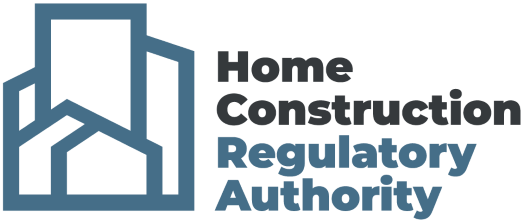
Critical Path: What to do when things go wrong
July 20, 2023
Ontario has high standards in the new home building sector, and homebuyers are right to expect builders to be professional and ethical.
For the most part, that is exactly what happens. Research indicates that most new home buyers have good relationships with their builder and are satisfied with the results.
However, there are exceptions. In those unfortunate cases, consumers do not have to simply accept bad behaviour. They can take action – by submitting a complaint to the Home Construction Regulatory Authority (HCRA).
Are you in the right place?
Every month the HCRA receives approximately 50 complaints. All are taken seriously. But, depending on the situation, it may not be appropriate for the HCRA to go any further. It’s important to understand the types of concerns the HCRA has authority to deal with and those it does not.
When a complaint is not within the HCRA’s scope it is referred to the appropriate channels. Most common in this regard are complaints related to defects and warranty claims around the home, which will be directed to Tarion. (That is, unless they also relate to the builder’s general competency, in which case they are most certainly a matter for the HCRA to pursue).
Another example is when a consumer is unhappy with the rules or standards that are not regulated by the HCRA such as building permitting processes or municipal zoning and land use policies. While it is up to the HCRA to ensure that builders understand and abide by these rules, the laws and regulations themselves are the responsibility of municipal and provincial governments. As such, these complaints need to be directed to the Ministry of Public Business and Service Delivery or the municipality involved.
We recommend a bit of research beforehand to determine the appropriate place to lodge a complaint – which will lead to a faster resolution. If the HCRA isn’t the right avenue, we will do our best to point you in the right direction.
When to turn to the HCRA
Now let’s look at what the HCRA can help with:
- Professional conduct concerns – such as unethical behaviour
- Concerns about builder competency
- Concerns about builder financial viability and responsibility
- Building or selling a new home without a licence – which is illegal in Ontario
- Anyone building or selling a new home in the province is required to have a valid licence with the HCRA. Learn more on a licence to build homes in our previous blog.
To maintain their licence, the people who sell and build homes in Ontario must follow the law. They are also obligated to abide by the province’s Code of Ethics. Failure to do so is grounds for complaint – and for the HCRA to take action.
The Code of Ethics sets out clear and specific principles for how Ontario home builders are expected to behave. It’s also a roadmap for consumers to understand the conduct standards that licensed builders must meet.
In total there are 20 principles which all licensees must adhere to. To name a few, this includes:
- Complying with the law
- Financial responsibility
- No misrepresentation
- Providing conscientious and competent service
Over the last year, here are some complaints that the HCRA has received:
Poor Communication
- Builders are expected to provide conscientious, courteous and responsive service, and demonstrate reasonable knowledge, skill, judgment and competence.
- If there are major changes to a project, if a purchaser has questions or if a purchaser has concerns about defects or other customer service issues, builders are expected to be responsive, and to communicate clearly and professionally with the purchaser.
Intimidation, Coercion and Obstruction
- Ontario’s laws are very clear: Builders must not obstruct anyone from making a complaint to the HCRA, or obstruct the HCRA from inquiring into a complaint. The Code of Ethics further states that a builder must not intimidate, coerce or subject anyone to undue pressure. The HCRA has also since issued an Advisory to remind licensees of this obligation.
Financial Responsibility
- Homes are a significant investment, with buyers trusting their financial interests to builders. As such, it’s important that in addition to demonstrating technical competence, builders demonstrate financial responsibility.
- Sometimes the HCRA may have concerns about a builder’s financial viability or other money-related challenges. Some indicators of possible financial issues include, unexplained (typically significant) price increases, lengthy delays, an inability to close, and refusing to provide the HCRA with financial documentation. Visit Regulatory Activities & Enforcement to learn more about actions the HCRA has taken against builders who cannot demonstrate financial viability or responsibility
If you have concerns about any of the above, you can submit a complaint by completing this Complaints Form.
You’ve submitted a complaint – what happens next?
The HCRA’s complaint system operates on two fundamental principles: giving consumers a clear path to voice their concerns and ensuring a fair review process for all parties involved.
After a complaint is submitted, it is assessed using a risk-based framework – with high risk concerns receiving urgent attention. The HCRA takes all complaints seriously and is committed to responding to every complaint it receives. The HCRA immediately acknowledges receipt of a complaint, following up with you within 3-5 business days to speak with you about your concerns, including obtaining any additional information necessary to move forward.
What could happen
As each situation is unique, the HCRA has a number of tools to address complaints.
For complaints that are lower on the severity scale, we might issue a written warning or ask builders to take further education courses.
At the other extreme, the HCRA can revoke a licence, one of the most severe consequences – in essence putting the builder out of the new home building business. Once a licence has been revoked, the builder cannot simply reapply under a new company name and continue operating. The HCRA’s licensing process assesses all applicants’ financial history, competency, and any past conduct concerns connected to the builder (and relevant persons connected to it), including a previously revoked licence.
Fortunately, the vast majority of Ontario’s more than 6,500 licensed builders and vendors are solid professionals who play by the rules. It’s the few bad apples we need to crack down on – and we will do so for the protection of consumers and ethical builders alike.
